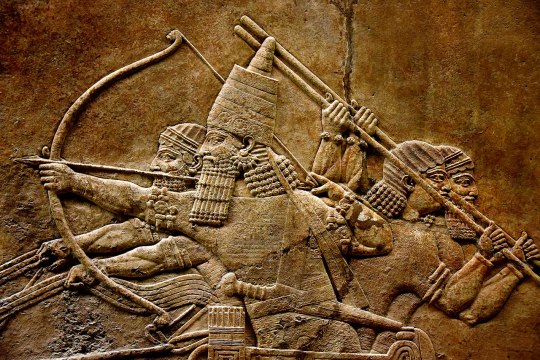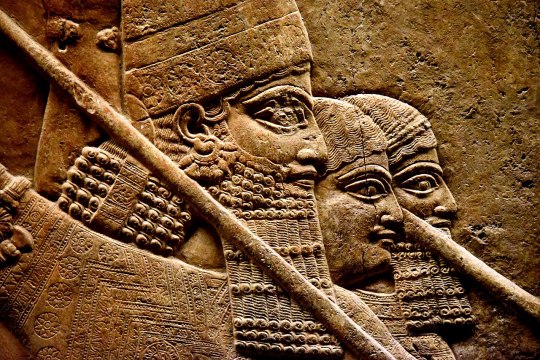Text
“He who is discontented with things present, and allotted by fortune, is unskillful in life. But he who bears them, and the consequences arising from them, nobly and rationally, is worthy to be esteemed a good man.”
— Epictetus, Fragments
327 notes
·
View notes
Text
“A society which is mobile, which is full of channels for the distribution of a change occurring anywhere, must see to it that its members are educated to personal initiative and adaptability. Otherwise, they will be overwhelmed by the changes in which they are caught and whose significance or connections they do not perceive.”
— John Dewey, Democracy and Education
392 notes
·
View notes
Photo

Cuneiform tablet, Ancient Near Eastern Art
Rogers Fund, 1952 Metropolitan Museum of Art, New York, NY Medium: Bronze
http://www.metmuseum.org/art/collection/search/324238
214 notes
·
View notes
Text
3.2.1 Ontological argument

An ontological argument is a philosophical argument for the existence of God that uses ontology. Many arguments fall under the category of the ontological, and they tend to involve arguments about the state of being or existing. More specifically, ontological arguments tend to start with a priori theory about the organization of the universe. If that organizational structure is true, the argument will provide reasons why God must exist.
The first ontological argument in the Western Christian tradition[1] was proposed by Anselm of Canterbury in his 1078 work Proslogion. Anselm defined God as "that than which nothing greater can be thought", and argued that this being must exist in the mind, even in the mind of the person who denies the existence of God. He suggested that, if the greatest possible being exists in the mind, it must also exist in reality. If it exists only in the mind, then an even greater being must be possible—one which exists both in the mind and in reality. Therefore, this greatest possible being must exist in reality. Seventeenth-century French philosopher René Descartes deployed a similar argument. Descartes published several variations of his argument, each of which centred on the idea that God's existence is immediately inferable from a "clear and distinct" idea of a supremely perfect being. In the early eighteenth century, Gottfried Leibniz augmented Descartes' ideas in an attempt to prove that a "supremely perfect" being is a coherent concept. A more recent ontological argument came from Kurt Gödel, who proposed a formal argument for God's existence. Norman Malcolm revived the ontological argument in 1960 when he located a second, stronger ontological argument in Anselm's work; Alvin Plantinga challenged this argument and proposed an alternative, based on modal logic. Attempts have also been made to validate Anselm's proof using an automated theorem prover. Other arguments have been categorised as ontological, including those made by Islamic philosophers Mulla Sadra and Allama Tabatabai.
Since its proposal, few philosophical ideas have generated as much interest and discussion as the ontological argument. Nearly all of the great minds of Western philosophy have found the argument worthy of their attention, and a number of criticisms and objections have been mounted. The first critic of the ontological argument was Anselm's contemporary, Gaunilo of Marmoutiers. He used the analogy of a perfect island, suggesting that the ontological argument could be used to prove the existence of anything. This was the first of many parodies, all of which attempted to show that the argument has absurd consequences. Later, Thomas Aquinas rejected the argument on the basis that humans cannot know God's nature. Also, David Hume offered an empirical objection, criticising its lack of evidential reasoning and rejecting the idea that anything can exist necessarily. Immanuel Kant's critique was based on what he saw as the false premise that existence is a predicate. He argued that "existing" adds nothing (including perfection) to the essence of a being, and thus a "supremely perfect" being can be conceived not to exist. Finally, philosophers including C. D. Broad dismissed the coherence of a maximally great being, proposing that some attributes of greatness are incompatible with others, rendering "maximally great being" incoherent.
Contemporary defenders of the ontological argument include Alvin Plantinga, William Alston and David Bentley Hart.
The basis of the ontological argument screams flawed, the following criticisms are relieving to read. Anselm’s claim that anything conceived as “perfect” in the mind means an undeniably existence in the physical real feels iniquitous. This is not an argument to consider seriously.
0 notes
Photo

Relief from Arch of Titus, Triumphal procession celebrating the crushing of the Jewish revolt in 70 AD. By Titus. Prominent among the spoils is the menorah, seven branched lamp-holder from the temple of Jerusalem. Rome
992 notes
·
View notes
Photo


Art depicting the destruction of the second temple and siege of Jerusalem by the Romans in 70 CE
Francesco Hayez (1867)
David Roberts (1850)
162 notes
·
View notes
Text
3.1.3 Aquinas' Five Ways

Thomas Aquinas (1225 - 1274, Catholic/Anglican/Lutheranism Italy) developed his five arguments for God's existence.
The unmoved mover argument asserts that, from our experience of motion in the universe (motion being the transition from potentiality to actuality) we can see that there must have been an initial mover. Aquinas argued that whatever is in motion must be put in motion by another thing, so there must be an unmoved mover.[36]
Aquinas' argument from first cause started with the premise that it is impossible for a being to cause itself (because it would have to exist before it caused itself) and that it is impossible for there to be an infinite chain of causes, which would result in infinite regress. Therefore, there must be a first cause, itself uncaused.[36]
The argument from necessary being asserts that all beings are contingent, meaning that it is possible for them not to exist. Aquinas argued that if everything can possibly not exist, there must have been a time when nothing existed; as things exist now, there must exist a being with necessary existence, regarded as God.[36]
Aquinas argued from degree, considering the occurrence of degrees of goodness. He believed that things which are called good, must be called good in relation to a standard of good—a maximum. There must be a maximum goodness that which causes all goodness.[36]
The teleological argument asserts the view that things without intelligence are ordered towards a purpose. Aquinas argued that unintelligent objects cannot be ordered unless they are done so by an intelligent being, which means that there must be an intelligent being to move objects to their ends: God.[36]
Interesting concepts. The unmoved mover and first cause draw similarities to News first law “every object will remain at rest or in uniform motion in a straight line unless compelled to change its state by the action of an external force” and the argument of degree parallels to CS Lewis idea of objective morality. Teleological argument seems like the basis for intelligent design. All in all, it feels like a poor attempt to create truths that suit ones agenda, outdated and too speculative.
0 notes
Text
“Never has our future been more unpredictable, never have we depended so much on political forces that cannot be trusted to follow the rules of common sense and self-interest — forces that look like sheer insanity, if judged by the standards of other centuries.”
— Hannah Arendt, The Origins of Totalitarianism
627 notes
·
View notes
Photo

THE GREAT MESOPOTAMIAN FLOOD MYTH
Below is an excerpt from my post: THE SUMERIANS, FOREFATHERS OF CIVILIZATION IN MESOPOTAMIA.
According to Sumerian, Akkadian and later Babylonian mythology the Anunnaki made the Igigu (lesser gods) dig canals and clear channels but in time they grew tired and rebelled.
“When the gods, man-like, Bore the labor, carried the load, the gods’ load was great, The toil grievous, the trouble excessive. The great Anunnaku, the Seven, Were making the Igigu undertake the toil.”
The gods sacrificed one of the rebel leaders (Geshtu-e, his name meaning “a god who had intelligence”) and to make from his remains and clay a new being to take on this labor, humans.
“Let them slaughter one god, so that all the gods may be purified by dipping. With his flesh and blood let Nintu mix clay. So let god and man be mingled together in the clay. After she had mixed the clay, she called the Anunna[ki], the great gods. The Igigu, the great gods, spat upon the clay. Mami opened her mouth and said to the great gods: “You commanded me a task and I have finished it, I have removed your toil, I have imposed your load on man.”” – Atrahasis Epic
In time humans grew too numerous and loud for the gods to handle, the ‘clamor’ prevented Enlil from sleeping. The gods decided to bring forth calamities against them in the form of drought, followed by pestilence and famine; each time man had recovered from these and multiplied once again.
“The country was as noisy as a bellowing bull. The God grew restless at their racket, Enlil had to listen to their noise. He addressed the great gods, 'The noise of mankind has become too much, I am losing sleep over their racket. Give the order that surrupu-disease shall break out.”
Despite Enki’s (Babylonian Ea) arguing the gods decide to send a great flood that would kill off mankind. Enki warns his human servant to dismantle his house, build a boat from its remains and fill it with two of every animal.

^ Christ stilleth the Tempest by John Martin, 1852.
“Like a wild ass screaming the winds howled, the darkness was total, there was no sun. As for Nintu the Great Mistress, her lips became encrusted with rime. The great gods, the Anunna[ki], stayed parched and famished. The goddess watched and wept.”
After the flood Nintu and the other gods wept in grief and regret for the annihilation of man as they “clog the river like dragonflies”. Note that it says river and not the world, hinting towards it being a local flood and not a global one but much later this tale was added to the Epic of Gilgamesh which replaces the sentence with “Like the spawn of fishes, they fill the sea”. The gods, without sacrifices from man grew hungry and thirsty but Enki’s servant survived the flood and offered the gods a sacrifice from which they feasted.

^ The Deluge by Francis Danby.
Nonetheless Enlil was angered at Enki for deceiving them but Enki brought them the proposal that they can create new humans that will not only live shortened lives but will be less fertile, become victims of miscarriage (now only two-thirds of births will be successful), priestesses will remain celibate virgins and the pasittu (she-demon) that would ‘snatch babies from their mother’s lap’. Enki’s servant is separated from these new men and placed within a paradise alongside his wife to live eternally.
If there are any errors please privately inbox me so I can update it. As always, if you’d like to read or learn about any specific historical subjects just let me know what they are and I will take note of them.
See Also:
For information on one of the earliest recorded civilizations on earth, the Sumerians, their evolution into city-states and their rivalrous history - read: THE SUMERIANS, FOREFATHERS OF CIVILIZATION IN MESOPOTAMIA.
For information on Sargon the Great and his Akkadian Empire, the revival of the Sumerian Empire, the Gutian and Amorite invasions as well as the Sumer-Akkadian military - read: THE AKKADIANS AND THE SUMERIAN RENAISSANCE, BRONZE AGE TITANS OF MESOPOTAMIA.
262 notes
·
View notes
Link
I find it frustrating that none of the reports I’ve read on this piece say why it’s a certainty that it’s a king’s head. They mention the gold ‘crown’ around his head, but not why it’s considered a crown.

42 notes
·
View notes
Quote
It is more civilized to make fun of life than to lament over it.
Seneca, On the Shortness of Life (via philosophybits)
1K notes
·
View notes
Text
3.1.3 Argument from consciousness

The argument from consciousness claims that human consciousness cannot be explained by the physical mechanisms of the human body and brain, therefore, asserting that there must be non-physical aspects to human consciousness. This is held as indirect evidence of God, given that notions about souls and the afterlife in Christianity and Islam would be consistent with such a claim. Critics point out that non-physical aspects of consciousness could exist in a universe without any gods; for example, some religions that believe in reincarnation are compatible with atheism, monotheism, and polytheism.[citation needed]
The notion of the soul was created before modern understanding of neural networks and the physiology of the brain. Decades of experimentation lead cognitive science to consider thought and emotion as physical processes although the experience of consciousness still remains poorly understood.[citation needed] The hard problem of consciousness remains as to whether different people subjectively experience the world in the same way — for example, that the color blue looks the same inside the minds of different people, though this is a philosophical problem with both physical and non-physical explanations.[citation needed]
Hmm, consciousness is an issue that I’m extremely uneducated on. I’ve always credited consciousness to neurology and complexities of the brain but it says it cannot be explained through these physical means.
Interestingly, we see the pattern resurface: where Science cannot comment on a matter, Philosophy steps in (Tyson describes this as a god-of-gaps fallacy but all theories are the bridge between gaps in of our knowledge + ) Where man cannot understand things, conclusions are drawn from the immaterial realm. Hence the birth of mythology, religion, thought and science. Paul also makes this distinction of physical and non-physical in the bible, where he writes quite clearly about spiritual and fleshly matters. Consciousness sits in the realm of the non-physical, it becomes a spiritual matter. The Bible is a powerful contender on spiritual matters and attempts to address these spiritual matters with interesting ideas of love, compassion and patience etc. The bible acknowledges complex ideas of moral perception, consciousness, free will and rational thought and encourages people to imitate Jesus, the reflection of God to address these. Consciousness is evidence of a non-physical realm where thought, emotions and ideas exist.
photo cred
0 notes
Photo
Imagine tho

18 notes
·
View notes
Text
Beyond the Bounds

C. S. Lewis once wrote, “Everyone who believes in God at all believes that He knows what you and I are going to do tomorrow.” but this is precisely what open theists deny. That is why many would concur with Timothy George, who says, “Open theism teaches a sub Christian view of God that is unworthy of a robust biblical faith. I have no sympathy for this view and think it would be a great mistake for evangelicals to welcome it within the bounds of tolerable theological diversity.” It is crucial to understand that open theism is not just another intramural squabble among evangelicals. It is not a debate about second-order doctrines, minutiae, or peripheral matters. Rather, it is a debate about God and the central features of the Christian faith. The contributors to Beyond the Bounds stand with a growing chorus of contemporary scholars who have made clear what is at stake in this debate. D. A. Carson argues that open theism “so redefines the God of the Bible and of theology that we wind up with a quite different God.” Wayne Grudem contends that open theism “ultimately portrays a different God than the God of the Bible.” And R. Albert Mohler, believes that “The very identity and reality of the God of the Bible is at stake.”3 Open theism is, at its roots, a question about the nature of God. Open Theism presents us with a different God—a God compatible, perhaps, with contemporary sentiments, but one who is not the God of the Bible.
Wow, I need to read more. This text, reflects my feelings on the struggle to accept concepts such as Creation, Intelligent design, Ontological, Cosmological and the Argument of beauty, these are all poorly construed arguments loosely based on Scientific evidence and poor logic that misrepresent God and Biblical values and teachings.
It however, is focusing on open theism. “Open theism,” also known as “openness theology,” the “openness of God,” and “free will theism,” is an attempt to explain the foreknowledge of God in relationship to the free will of man. The argument of open theism is essentially this: human beings are truly free; if God absolutely knew the future, human beings could not truly be free. Therefore, God does not know absolutely everything about the future. Open theism holds that the future is not knowable. Therefore, God knows everything that can be known, but He does not know the future. Open theism is an irrelevant teaching much like the aforementioned ideas. God can foresee the future, but his foreknowledge of the future is not something examined in depth because, it is of very little importance. He has given us free will, like that of Adam and Eve.
0 notes




